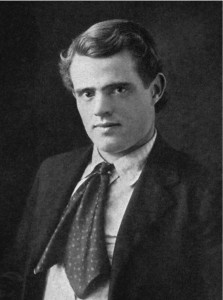 Jack London, born in San Francisco in 1876, had firsthand experience as an oyster pirate. At fifteen, he worked in this capacity in San Francisco Bay, from his sloop Razzle Dazzle. The next year, after the sloop had become irreparably damaged, he switched sides and joined the California fish Patrol, in Benicia, as a deputy patrolman. By the time he published his story collection Tales of the Fish Patrol in 1905, London had traveled to the Klondike in search of gold, suffered scurvy, sailed to Japan and Korea to report on the Russo-Japanese War for the Hearst syndicate, and published two of his most famous books, The Call of the Wild and The Sea-Wolf.
Jack London, born in San Francisco in 1876, had firsthand experience as an oyster pirate. At fifteen, he worked in this capacity in San Francisco Bay, from his sloop Razzle Dazzle. The next year, after the sloop had become irreparably damaged, he switched sides and joined the California fish Patrol, in Benicia, as a deputy patrolman. By the time he published his story collection Tales of the Fish Patrol in 1905, London had traveled to the Klondike in search of gold, suffered scurvy, sailed to Japan and Korea to report on the Russo-Japanese War for the Hearst syndicate, and published two of his most famous books, The Call of the Wild and The Sea-Wolf.
Like most of his years, 1905 was an active one for London. He divorced his first wife, Bessie, and married his second, Charmian, honeymooned in Jamaica and Cuba, purchased the first parcels of land in Glen Ellen, which would become part of his Beauty Ranch, ran unsuccessfully as the social- ist candidate for mayor of Oakland, garnering 981 votes, and published War of the Classes, which opens with the memorable line “When I was a youngster I was looked upon as a weird sort of creature, because, forsooth, I was a socialist.”
The next year, at age 30, London got a new set of teeth, lectured at Yale University and Carnegie Hall, published White Fang, began building his yacht Snark, and reported on the San Francisco earthquake for Collier’s Weekly. London had the indignity of being called a “nature faker” by president Theodore Roosevelt, and he responded in Collier’s by referring to the president as “homocentric” and “amateur.”
In his later years, London primarily churned out stories. Plot-challenged at times, he bought fourteen story plots for $75 from the then unknown Sinclair Lewis. London died at age forty, having lived a brief, outsized life and published scores of novels, short stories, and books of nonfiction.
